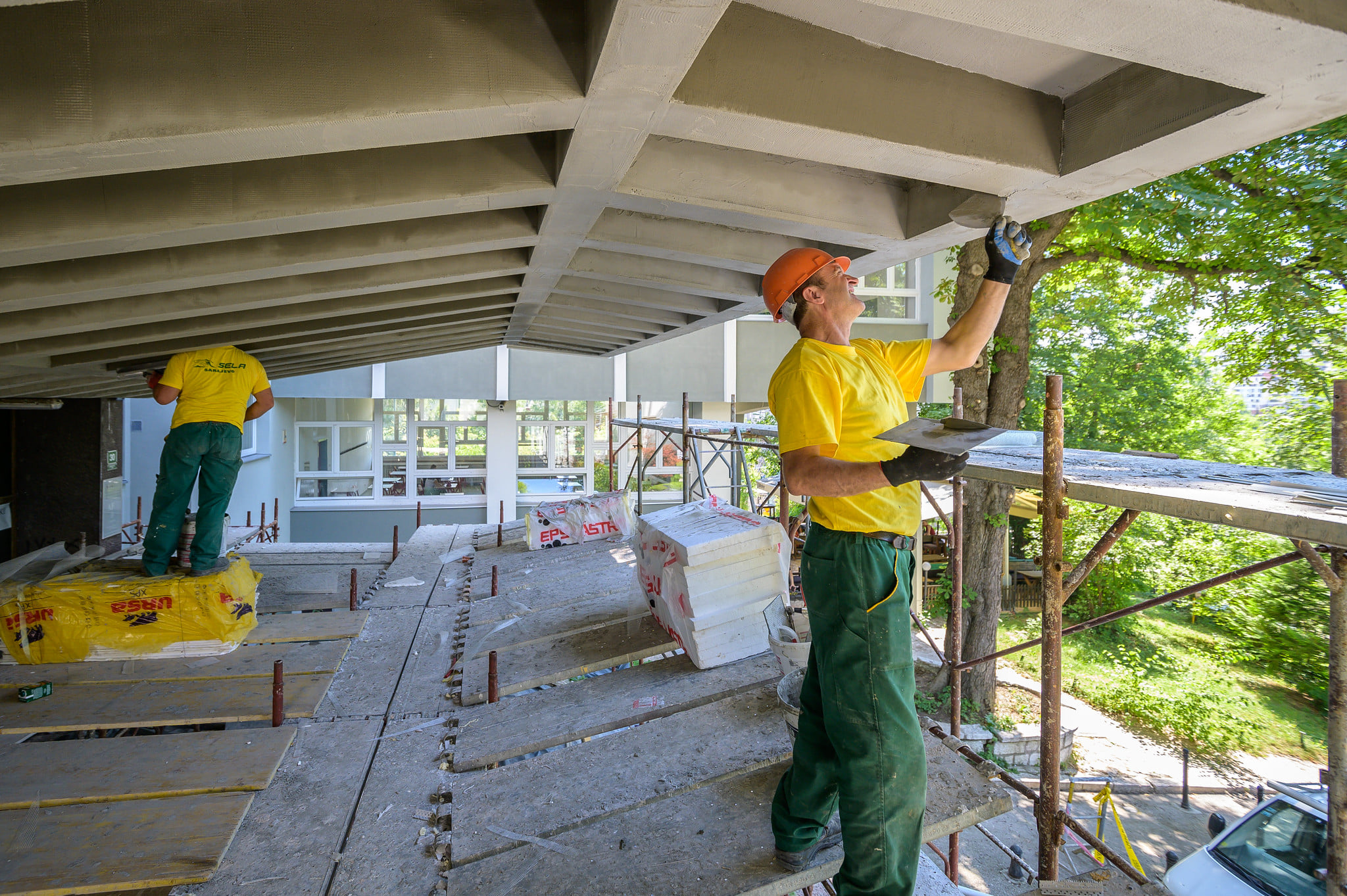Improving energy performance in Bosnia and Herzegovina through the expansion of Energy Service Companies
A future green and bright
July 13, 2022
It’s easy to wax poetic about the beauty of nature, the visceral affinity humans have for the natural world, or the call of the wild. At an emotional level, humanity evinces strong connections to the ecosystems that have shaped us, nurtured us, and contain to sustain us.
“The natural resources that surround us, which we have inherited, are invaluable, so we need to use them rationally and think about what we leave behind for generations.”For Mladen Vujica, a Secretary of Public Procurement Office of Central Bosnia Canton, this emotive appreciation for ecology also serves as a spur for quantitative, empirical conservation efforts.
This employment of economic sangfroid and cold calculation in service of the natural world is exemplified by the Energy Services Company (ESCO) model.
Implementing solutions - faster
The ESCO model allows companies to carry out energy services without the clients having to invest their own capital into the projects – essentially working to accelerate structural transformations.
Transforming the market for urban energy efficiency - a win-win concept
Conceived as a protocol for positive-sum benefits, the ESCO model is based on the idea that the company initially invests its funds in the renovation of public buildings and utility systems to reduce energy consumption and costs, and from these savings makes a profit in a defined period of time.
Though the model itself is relatively easy to understand, ESCO requires a multitude of expertise to realize sufficient energy efficiency gains to make a profit.
Mr Šerić is currently working for UNDP on the establishment of the ESCO mechanism in Bosnia and Herzegovina, within the “Catalyzing Environmental Financing for Low Carbon Urban Development" (URBANLED) project, funded by the Global Environment Facility (GEF) that will co-finance infrastructure projects and lay the foundations for a domestic ESCO market.
"In cooperation with domestic partners, UNDP is working on creating regulatory and market frameworks for ESCO, as well as piloting ESCO projects to showcase their benefits and answer operational questions about its implementation on both the demand side (i.e. national institutions) and supply side (i.e. ESCO bidders)."Siniša Rodić, UNDP BiH Programme Manager for Climate Change Mitigation
Energy transformations accelerated
To accelerate these structural transformations, UNDP is implementing the URBANLED project, in cooperation with the Ministry of Foreign Trade and Economic Relations of BiH, the Ministry of Physical Planning, Construction and Ecology of Republika Srpska, the Federal Ministry of Environment and Tourism, the Environmental Protection Fund FBiH and the Fund for Environmental Protection and Energy Efficiency of Republika Srpska.
The need for markets
The ESCO model is recognized in the EU as an important means of mobilizing private capital, as well as a job-creation opportunity.

"In no country in the world are public funds sufficient by themselves to achieve energy saving goals, especially in buildings. Therefore, raising private capital is considered necessary, and this brings the development of the ESCO model to the heart of energy efficiency policies. The ESCO idea is that it is by definition a market, and the role of the state and public bodies is to create demand and see through the process to ultimate implementation. Through the application of this model, public bodies get the opportunity to create jobs and better buildings and better conditions for people from nothing.”Mr Šerić said, adding that successful experiences from Croatia were used at the EU-level to place this innovative model at the centre of energy efficiency measures for public functions.
ESCO in BiH
About a fifth of Bosnia and Herzegovina's gross domestic product is spent on energy at present, compared to less than five percent in EU countries.
Energy consumption is highest in the building and public services sectors, indicating a pressing need to increase energy efficiency. The establishment of the ESCO market is one of the ways to encourage energy efficiency measures in order to, as Mr Šerić explains, demonstrate the potential of the ESCO model and those “ESCO companies gaining experience, references and investment capital” as they expand the practice to the residential and industrial sectors.
“The application of the ESCO model creates a market for ESCO services, which would be difficult to establish otherwise. The ESCO market is a precision instrument, in that it rewards the knowledge and ability to assess optimal investment and energy savings ratios. In order to create an enabling environment for the development of ESCO companies, it would be good to establish long-term contracting plans according to the ESCO model, which would certainly encourage companies to plan their own development,” he noted.

Four pilots, four buildings
In 2021, UNDP and the Ministry of Science, Education, Youth, Culture and Sports of Central Bosnia Canton engaged in a nine-month long process of preparing the first ever in BiH ESCO public procurement, resolving legal and practical issues along the way and paving the path for other jurisdictions to implement their own.
The process started by examining 27 public buildings in the Canton. Based on the findings, four public buildings were selected to be part of the first ESCO procurement: three school and a police station.
Following this, the Canton government enabled the development and implementation of the ESCO, and with the support of UNDP developed technical specifications, energy performance contract, financial conditions, measurement of savings and determined energy and environmental benefits.
In the meantime, UNDP worked on setting up the market on the supply side, implementing capacity building activities and raising awareness of private sector about this opportunity.
Proof of concept
Notably, the ESCO model serves as a proof of concept for future prioritization of environmental factors in public procurement. So, although – as with all procurement in Bosnia and Herzegovina - the initiative ensures that, per Mr Vujica. “Every expenditure of public funds must be transparent, non-discriminatory, fair, and all with the aim of the most efficient use of public funds,” with the ESCO model, the conception of ‘efficient use of public funds’ includes attention to energy and environmental efficiency, along with economic efficiency.
Most dramatically, the ESCO catalyzed an investment of over US$1.2m, with additional co-financing (underwritten or guaranteed by UNDP and the Environmental Fund of FBiH) of over $330,000. This will generate cumulative savings in the selected buildings of >$40,000 per annum for the entire 10-year contract duration (and beyond), and result in projected annual greenhouse gas emission reductions of >400 tons of CO2eq.
“The future of ESCO is looking bright.”The success of the pilot programme has UNDP BiH Project Manager Hamdija Mujezin excited and energized.
Less energy; Brighter future
Following the pilot, the ESCO model has been adopted and procurement published for a public lighting system in the City of Cazin, with nearly $200,000 in investment and co-finance, and projected energy savings of nearly 100,000 kWh, corresponding with nearly 75 tones CO2eq in emissions reductions.
This will be joined by the implementation of a further 38 new ESCO projects across the country in 2022, including for public lighting systems in 15 more cities, a heating mini-grid inaugurated for 10 public buildings, efficiency projects in nine public buildings, and four waste/recycling transport vehicles.
This rapid roll-out demonstrates the utility of the concept and the clear demand it is generating; nearly all of this next round of ESCO projects were so eagerly sought by investors that they required no co-financing at all.
The project’s success shows that the preparatory work to facilitate ESCO development, including trainings for local government units and corporations, along with an educational campaign and the development of accounting protocols and implementation rulebooks for ESCO projects was key. The ESCO model - and its process of preparation, procurement, and implementation in Bosnia and Herzegovina - demonstrates that the future is bright.

 Locations
Locations